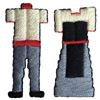 The Carpathian regions of Ukraine are famous for their traditional crafts and clothing. Nowhere else in Ukraine will you find as richly embellished and outstanding outfits as the clothing used by Ukrainian Hutsuls. These highlanders are very proud, skillful, and hardworking people. And all of that is reflected in their traditional costumes. Some pieces of clothing are used only in Carpathian regions and are really unique. If you haven't seen Hutsul folk costumes, you can't have the full picture of Ukrainian heritage in the art of traditional dressing.
The Carpathian regions of Ukraine are famous for their traditional crafts and clothing. Nowhere else in Ukraine will you find as richly embellished and outstanding outfits as the clothing used by Ukrainian Hutsuls. These highlanders are very proud, skillful, and hardworking people. And all of that is reflected in their traditional costumes. Some pieces of clothing are used only in Carpathian regions and are really unique. If you haven't seen Hutsul folk costumes, you can't have the full picture of Ukrainian heritage in the art of traditional dressing.
All the photos are from the National Museum of Hutsul and Pokuttya Folk Art in Kolomyia, Ukraine
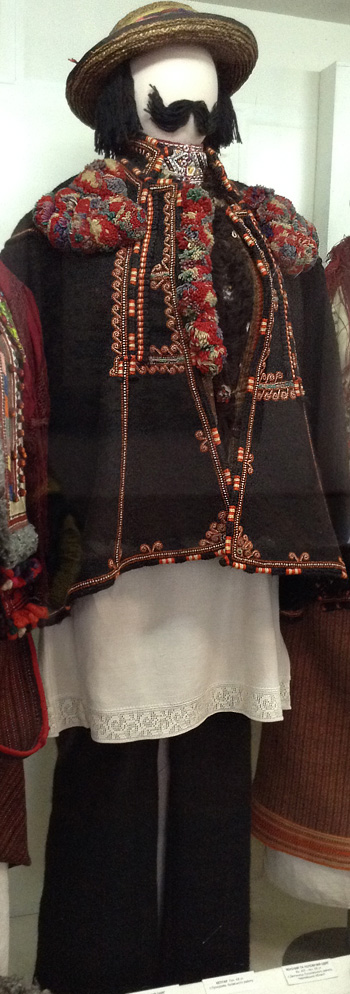
Traditional men's costume of the western part of Ukraine. This clothing was made in Putyliv district, Chernivtsi region of Ukraine at the end of the 19th century – the beginning if the 20th century. The outfit consists of a shirt, trousers, a sleeveless fur coat called "keptar", an outerwear called "serdak", and a straw hat called "kresanya"
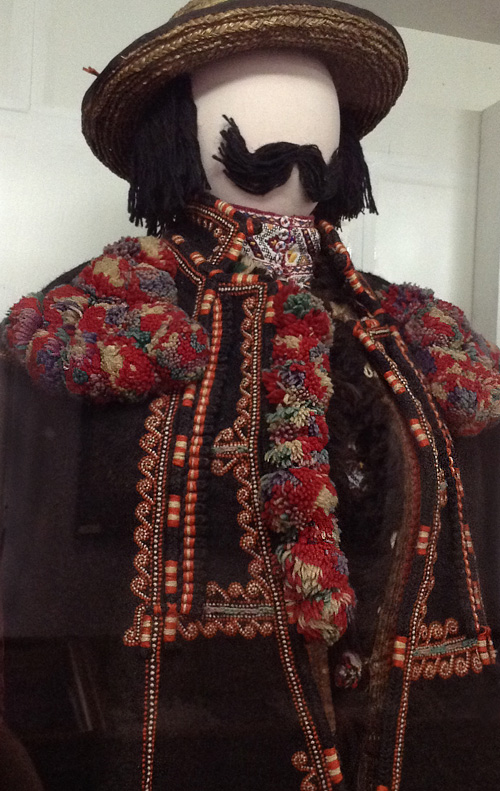
Traditional men's costume from Putyliv district, Chernivtsi region, the end of the 19th century – the beginning of the 20th century. Close-up view
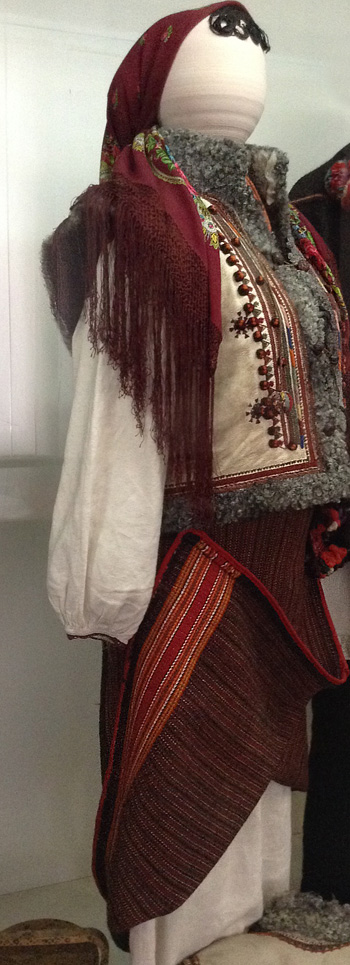 Traditional women's costume of the western part of Ukraine. This clothing was made in Kosiv district, Ivano-Frankivsk region at the beginning of the 20th century. The outfit consists of a long shirt, a wrap-around skirt called "zapaska", woven belt called "krayka", a sleeveless fur coat called "keptar", a kerchief, and jewelry
Traditional women's costume of the western part of Ukraine. This clothing was made in Kosiv district, Ivano-Frankivsk region at the beginning of the 20th century. The outfit consists of a long shirt, a wrap-around skirt called "zapaska", woven belt called "krayka", a sleeveless fur coat called "keptar", a kerchief, and jewelry
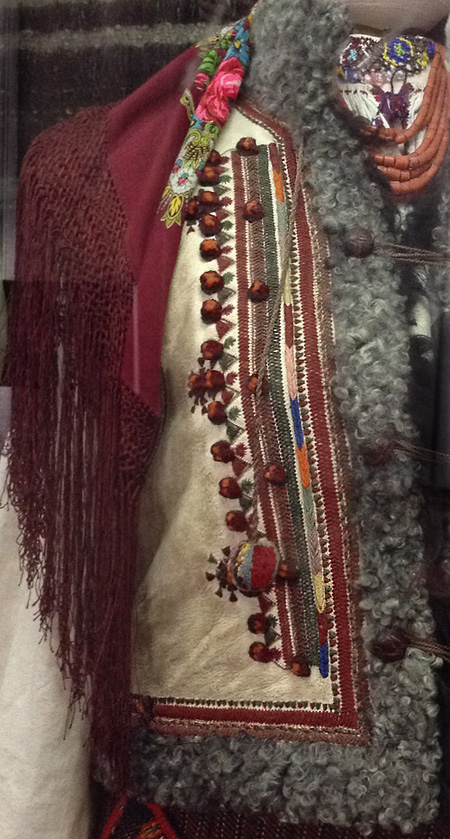
Traditional women's costume from Kosiv district, Ivano-Frankivsk region, the beginning of the 20th century. Close-up view. You can see the decorations of the sleeveless fur coat called "keptar"
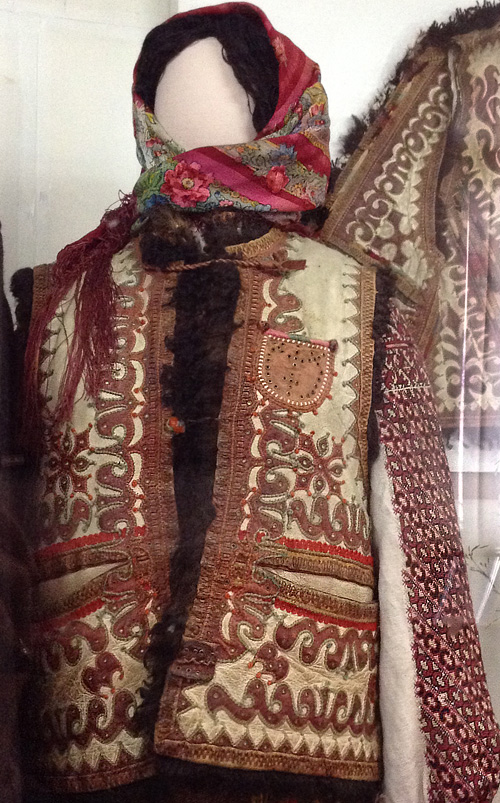
Traditional women's costume from Putyliv district, Chernivtsi region, the end of the 19th century – the beginning of the 20th century. Close-up view. You can see the richly embroidered sleeve of shirt, and a festive sleeveless fur coat called "keptar" with leather decorations and embroidery
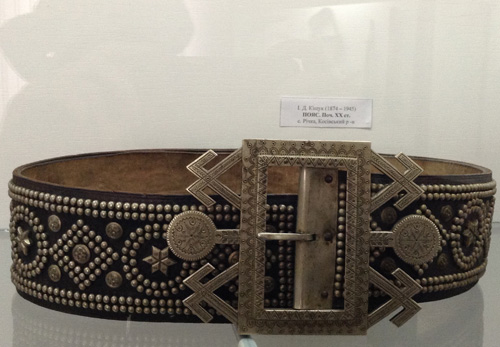
Very beautiful and richly embellished leather belt. The beginning of the 20th century. It was made in Kosiv district, Ivano-Frankivsk region of Ukraine. The most extraordinary thing is the belt buckle
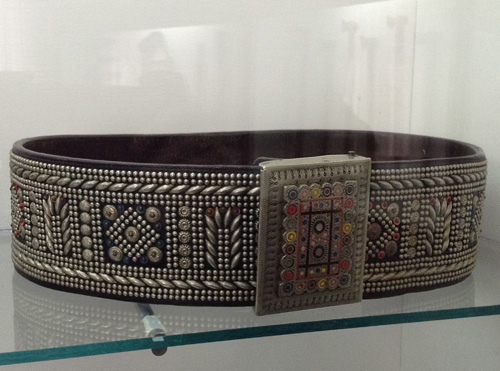
Ornate and festive leather belt. The beginning of the 20th century. It is embellished with metal decorations, multicolored sequins, and a colorful belt buckle. This belt was made in Kosiv district, Ivano-Frankivsk region of Ukraine
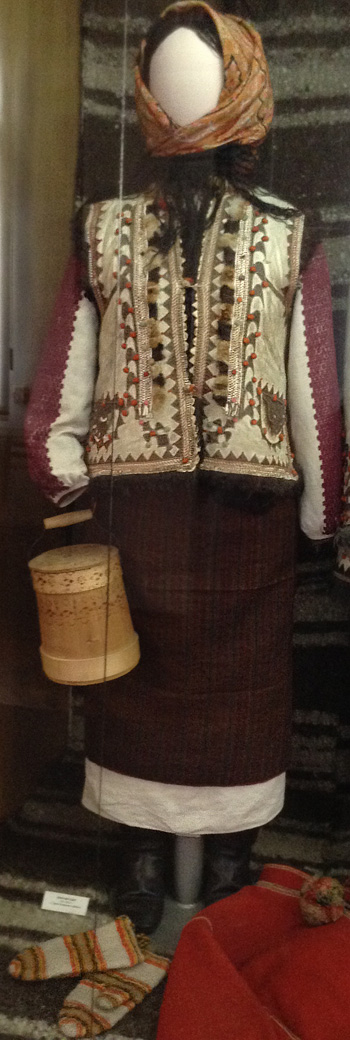
Traditional female costume of the western part of Ukraine. This clothing was made in Rakhiv district, Transcarpathian region of Ukraine at the beginning of the 20th century. The attire consists of a long shirt, a wrap-around skirt called "zapaska", a woven belt called "krayka", a sleeveless fur coat called "keptar", a kerchief, and leather boots
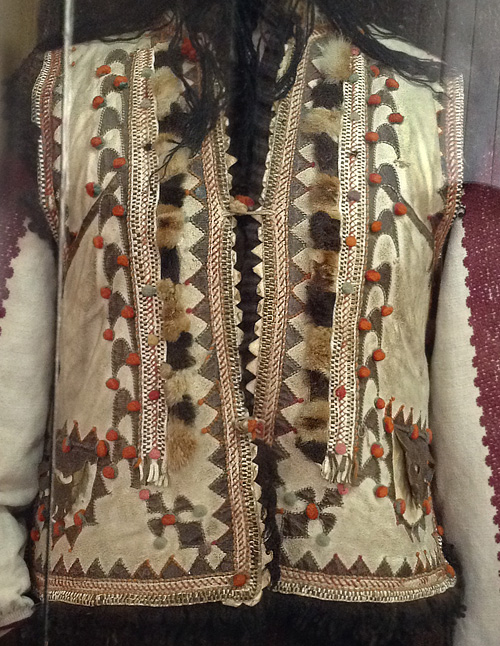
Traditional female costume from Rakhiv district, Transcarpathian region, the beginning of the 20th century. Close-up view. You can see a lot of decorations that are used to embellish the sleeveless fur coat called "keptar": embroidery, leather and fur elements, and tiny yarn pom-pons
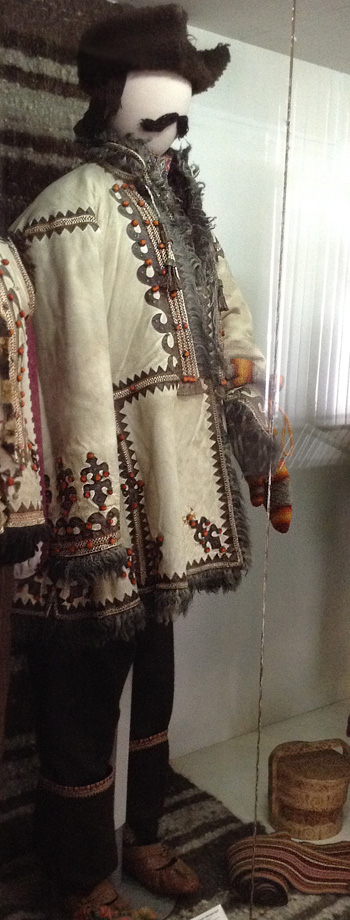
Traditional male costume of the western part of Ukraine. This clothing was made in Rakhiv district, Transcarpathian region of Ukraine at the beginning of the 20th century. The outfit consists of a shirt, trousers, a fur coat called "kozhukh", a warm hat, hand knitted mittens, woolen puttees, and leather shoes called "postoly"
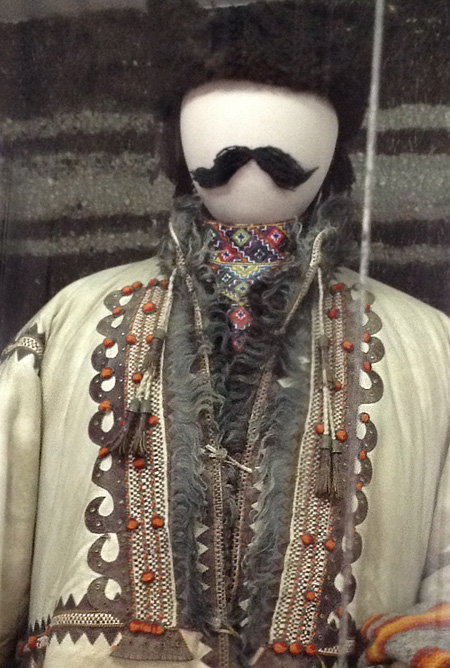
Traditional male costume from Rakhiv district, Transcarpathian region of Ukraine, the beginning of the 20th century. Close-up view
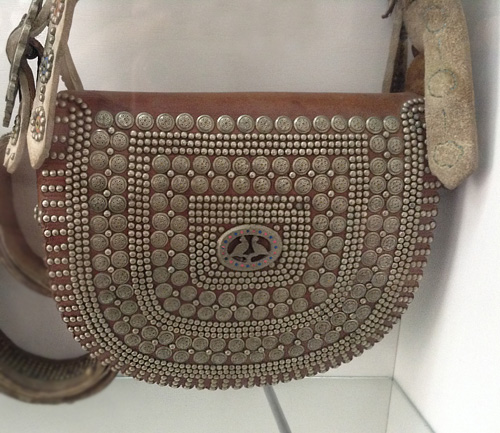 Elegant men's shoulder bag called "tashka". It is made of leather and embellished with metal decorations in the 19th century. Such bags were typical for the western part of Ukraine
Elegant men's shoulder bag called "tashka". It is made of leather and embellished with metal decorations in the 19th century. Such bags were typical for the western part of Ukraine
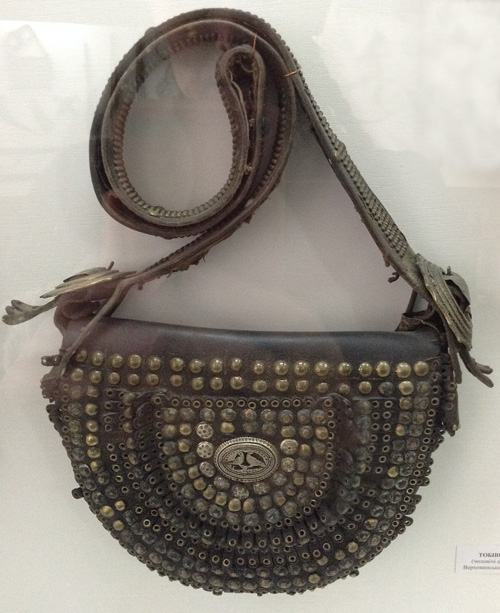 Leather shoulder bag with metal decorations called "tashka". It was used in Western Ukraine in the 19th century. Such bags were used by men
Leather shoulder bag with metal decorations called "tashka". It was used in Western Ukraine in the 19th century. Such bags were used by men
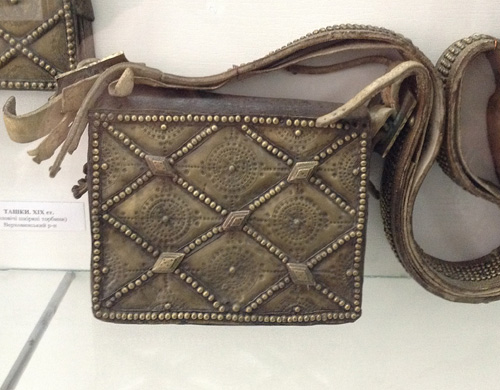 Male leather shoulder bag with a large metal decoration on the front part. It is called "tashka". This bag was crafted and used in the 19th century in Verkhovyna district, Ivano-Frankivsk region of Ukraine
Male leather shoulder bag with a large metal decoration on the front part. It is called "tashka". This bag was crafted and used in the 19th century in Verkhovyna district, Ivano-Frankivsk region of Ukraine
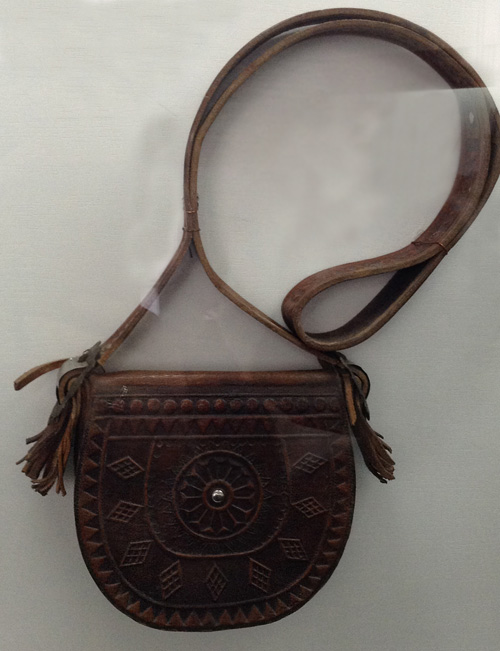
Small leather shoulder bag called "tashka" used by men in Western Ukraine in the 19th century. The front part of the bag has stamping on leather
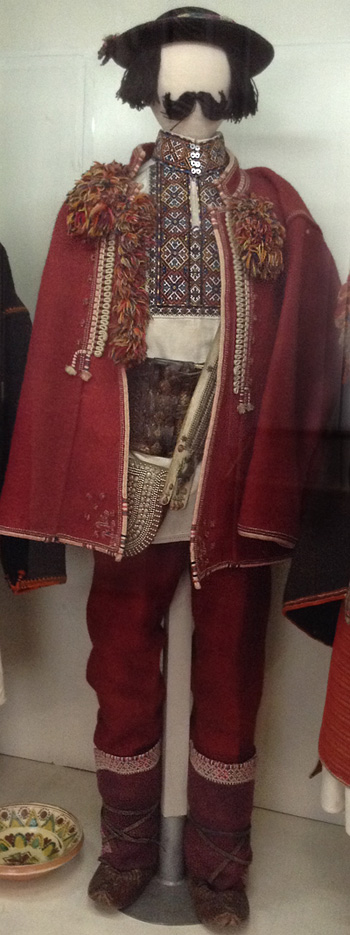
Traditional male costume of the western part of Ukraine. This clothing was made in Kosiv district, Ivano-Frankivsk region in the end of the 19th century. The outfit consists of a shirt, trousers, a belt called "cheres", an outerwear called "serdak", a hat called "kresanya", a kind of socks, leather shoes called "postoly", and a shoulder bag called "tashka"
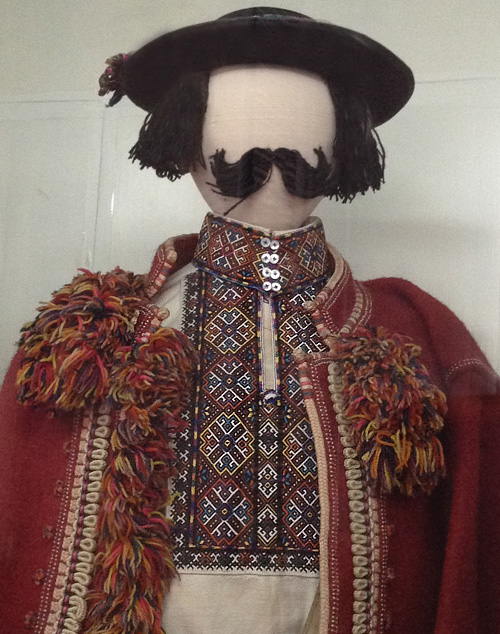
Traditional male costume of the western part of Ukraine. This clothing was made in Kosiv district, Ivano-Frankivsk region in the end of the 19th century. Close-up view. You can see the embroidery typical for the Western Ukraine, and yarn decorations of the outerwear called "serdak"
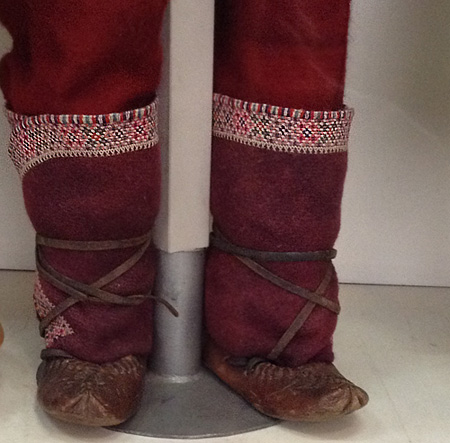
Men's woolen puttees and leather shoes called "postoly". The puttees are embroidered and look very festive
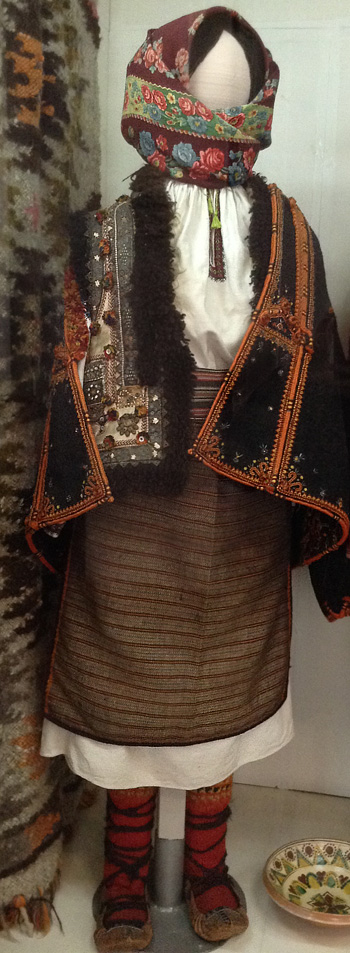
Traditional women's attire of the western part of Ukraine. This clothing was made in Kosiv district, Ivano-Frankivsk region in the end of the 19th century. The outfit consists of a shirt, a wrap-around skirt called "zapaska", a woven belt, a sleeveless fur coat called "keptar", a woolen outerwear called "serdak", a kerchief, woolen socks, and leather shoes called "postoly"
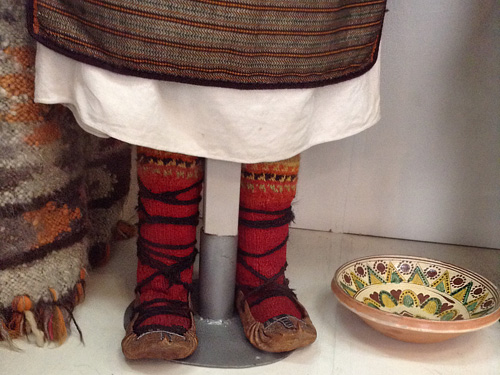
Women's hand-knitted socks and leather shoes called "postoly". Such shoes are typical for Carpathian regions of Ukraine
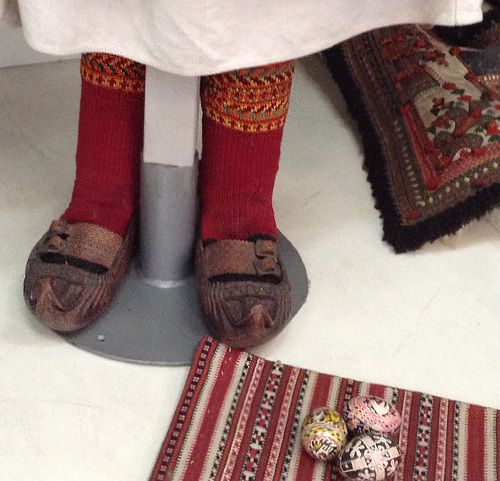
Female hand-knitted socks and leather shoes called "postoly"
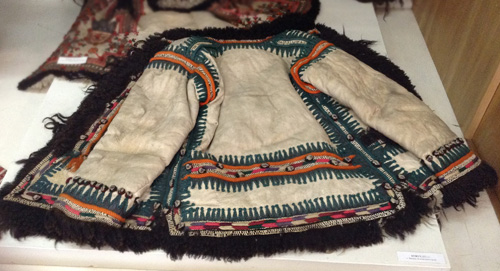
Outerwear made from sheepskin called "kozhukh". It was made in the 19th century in Kosiv district, Ivano-Frankivsk region of Ukraine. It is a short fur coat used by both men and women. Kozhukh usually is embroidered and embellished with metal or other decorations. This one has tiny yarn pom-pons
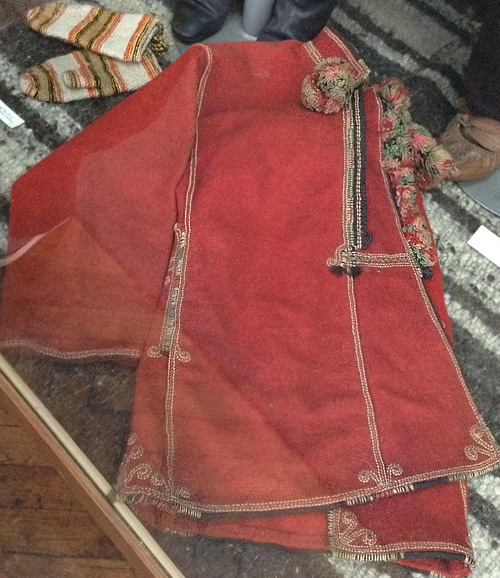
Men's woolen outerwear called "serdak". It is a short coat with sleeves, embellished with embroidery and other decorations (for example, yarn pom-pons). Usually, the color of serdak was black, red or gray
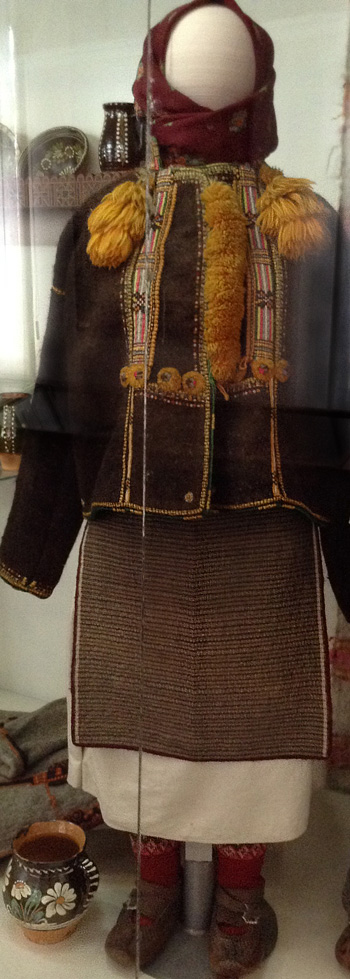
Traditional female costume of the western part of Ukraine. This clothing was made in Rakhiv district, Transcarpathian region of Ukraine at the beginning of the 20th century. The outfit consists of a long shirt, a wrap-around skirt called "zapaska", a woolen outerwear called "serdak", a kerchief, woolen socks, and leather shoes called "postoly"
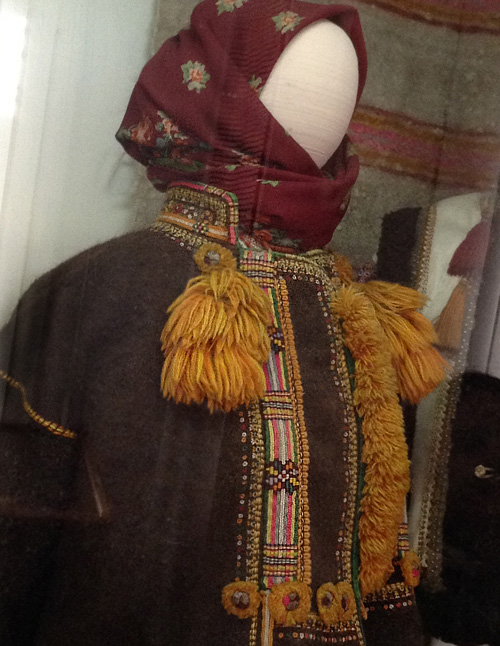
Traditional female costume from Rakhiv district, Transcarpathian region of Ukraine, the beginning of the 20th century. Close-up view
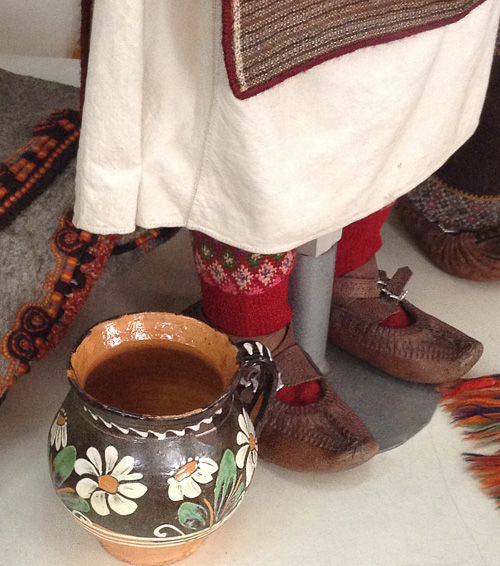
Women's hand-knitted socks and leather shoes called "postoly"
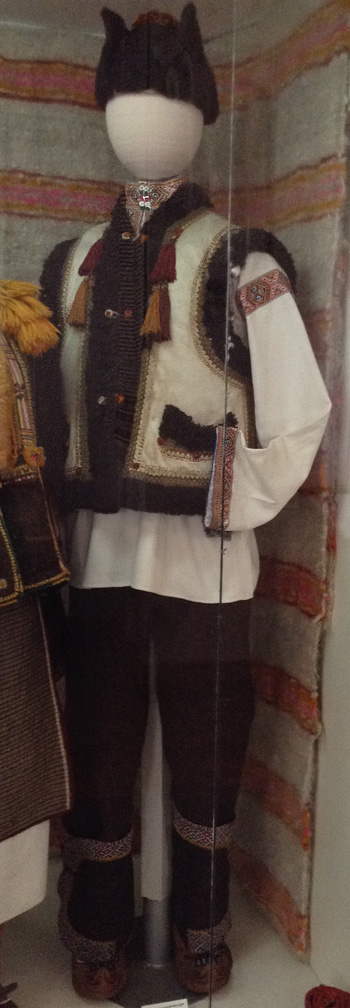
Traditional men's costume of the western part of Ukraine. This clothing was made in Rakhiv district, Transcarpathian region of Ukraine at the beginning of the 20th century. The outfit consists of a shirt, trousers, a sleeveless fur coat called "keptar", a headdress, woolen puttees, and leather shoes called "postoly"
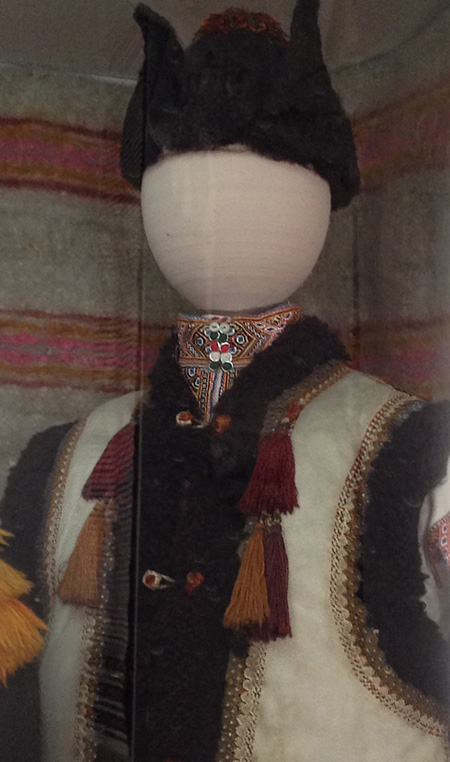
Traditional men's costume from Rakhiv district, Transcarpathian region of Ukraine, the beginning of the 20th century. Close-up view
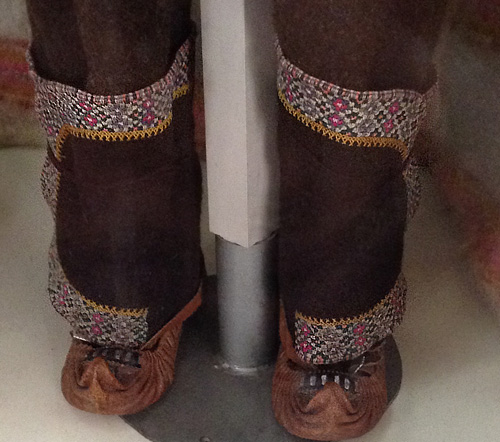
Men's woolen puttees and leather shoes called "postoly". The puttees are richly embroidered and look very festive
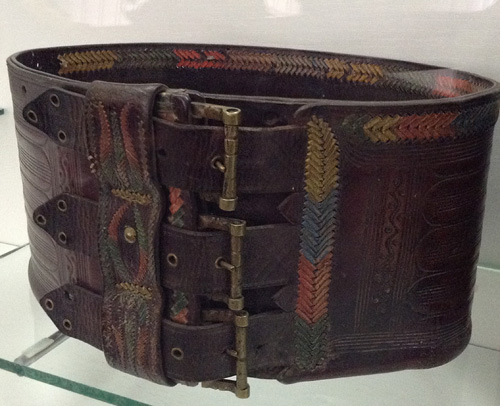
Beautiful wide leather belt called "cheres". Such male belts are typical for the western part of Ukraine. This one was made at the beginning of the 20th century in Verkhovyna district, Ivano-Frankivsk region. It has three buckles, some metal decorations, colorful embroidery, and stamping on leather
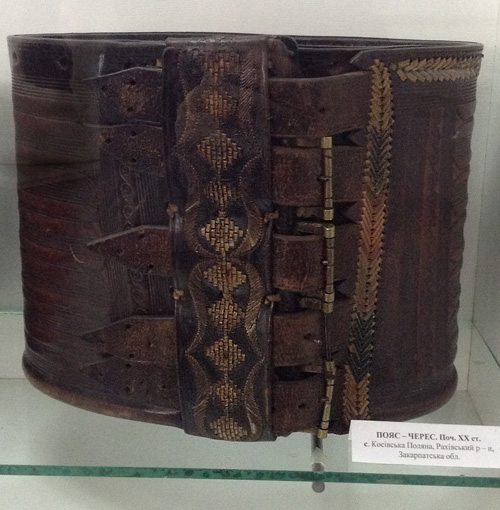
Very wide leather belt called "cheres". Such men's belts are used in Carpathian regions of Ukraine. This one was made at the beginning of the 20th century in Rakhiv district, Transcarpathian region of Ukraine. It has five fasteners, a lot of embroidery and stamping on leather
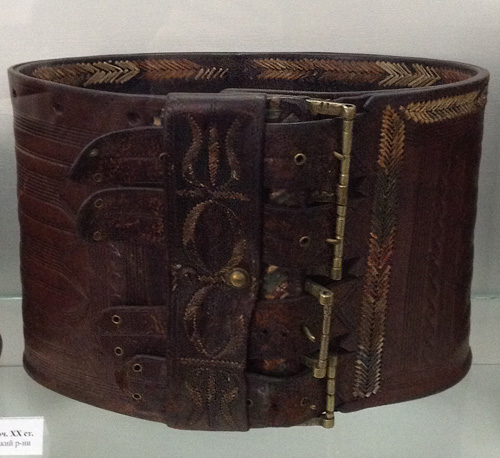
Men's wide leather belt called "cheres". Similar belts are used in Western Ukraine as a part of traditional costume. This one was made at the beginning of the 20th century in Kosiv district, Ivano-Frankivsk region of Ukraine. It has four fasteners, some metal decorations, colorful embroidery, and stamping on leather
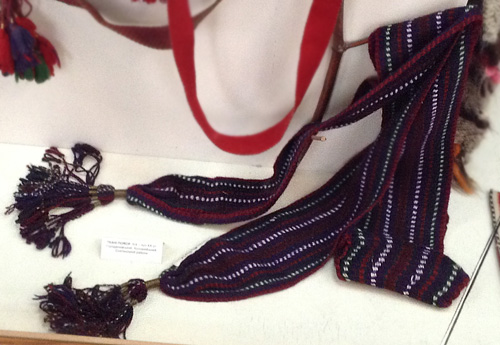
Women's woven belt called "krayka". Such belts were typical for the western part of Ukraine, but nowadays they are used in every region of the country

Traditional male costume of the western part of Ukraine. This clothing was made in Kosiv district, Ivano-Frankivsk region at the beginning of the 20th century. The outfit consists of a shirt, trousers, a sleeveless fur coat called "keptar", an outerwear called "serdak", a hat called "kresanya", and a shoulder bag called "tashka"
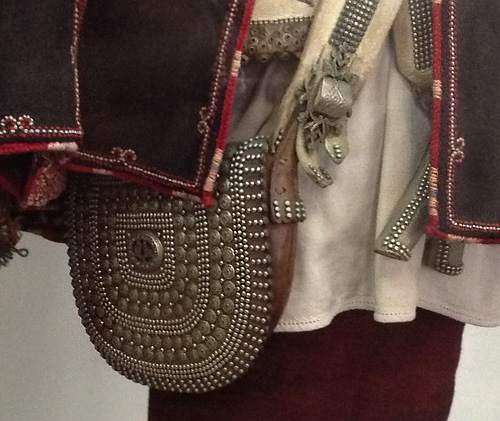
Traditional male costume from Kosiv district, Ivano-Frankivsk region, the beginning of the 20th century. Close-up view. You can see a leather shoulder bag called "tashka" with a lot of metal decorations

Traditional female costume of the western part of Ukraine. This clothing was made in Kosiv district, Ivano-Frankivsk region at the beginning of the 20th century. The outfit consists of a long shirt, a wrap-around skirt called "zapaska", woven belt called "krayka", a sleeveless fur coat called "keptar", a kerchief, woolen socks, leather shoes called "postoly", woven shoulder bag, and several necklaces
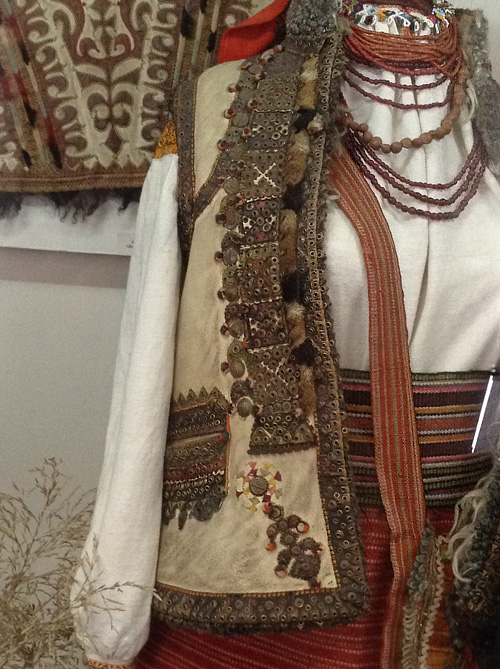
Traditional female costume from Kosiv district, Ivano-Frankivsk region, the beginning of the 20th century. Close-up view. You can see the embellishments of a sleeveless fur coat called "keptar". There are metal decorations, embroidery, and tiny yarn pom-pons
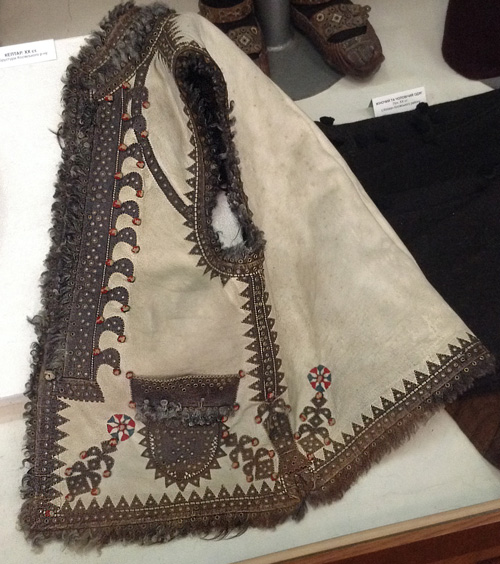
Sleeveless fur coat called "keptar" made from sheepskin and decorated with leather, metal elements, embroidery, and tiny yarn pom-pons. Keptar can be worn by both men and women
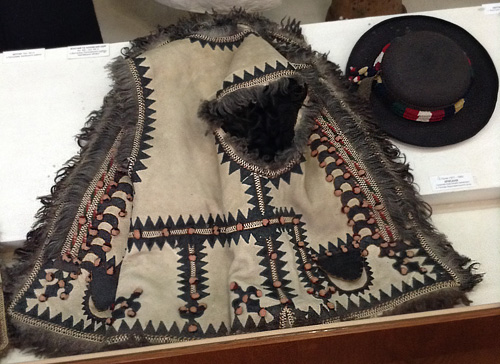
Sleeveless fur coat called "keptar" made from sheepskin and decorated with leather, embroidery, and tiny yarn pom-pons. This keptar was used by a man. There is a matching male hat called "kresanya". It is made from felt and decorated with a colorful woven cord
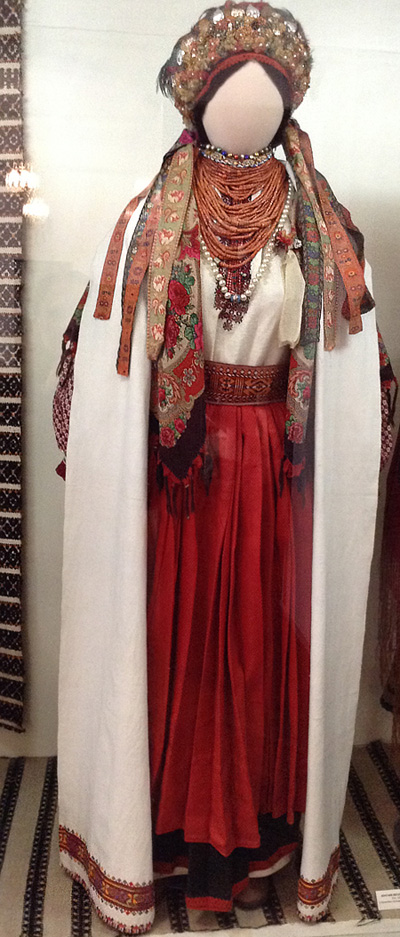
Female wedding dress of the western part of Ukraine. This clothing was made in Kolomyia district, Ivano-Frankivsk region at the beginning of the 20th century. The outfit consists of a long embroidered shirt, several skirts, a woven belt called "krayka", a large piece of white cloth with embroidered ends called "rantukh" (after the wedding a bride covered her head and neck with rantukh), a colorful kerchief, a headdress (wedding wreath with ribbons), leather boots, and a lot of jewelry
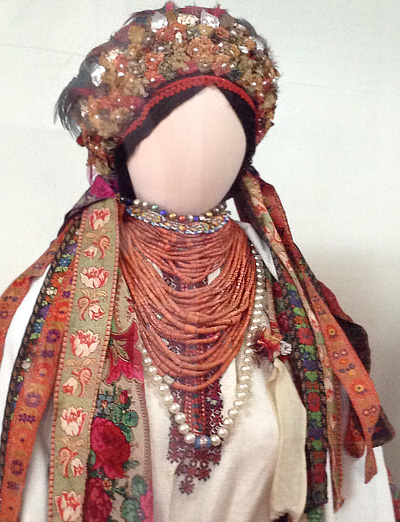
Female wedding dress from Kolomyia district, Ivano-Frankivsk region, the beginning of the 20th century. Close-up view
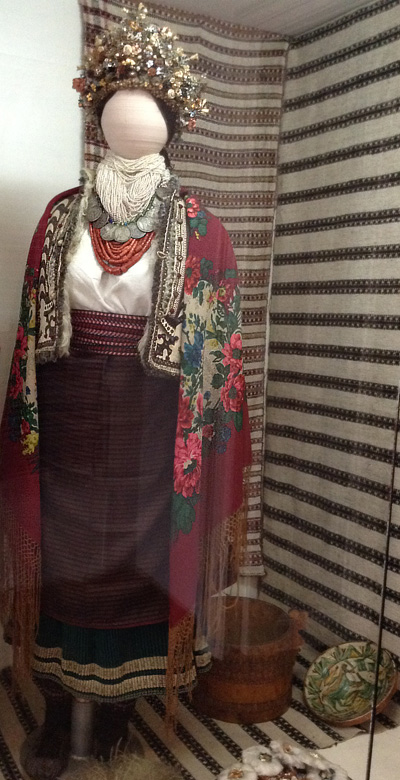
Women's wedding dress of the western part of Ukraine. This clothing was made in Kolomyia district, Ivano-Frankivsk region at the beginning of the 20th century. The outfit consists of a shirt, a skirt, an apron called "zapaska", a woven belt called "krayka", a sleeveless fur coat called "keptar", a large kerchief, a wedding headdress, hand knitted socks, leather shoes called "postoly", and a lot of jewelry
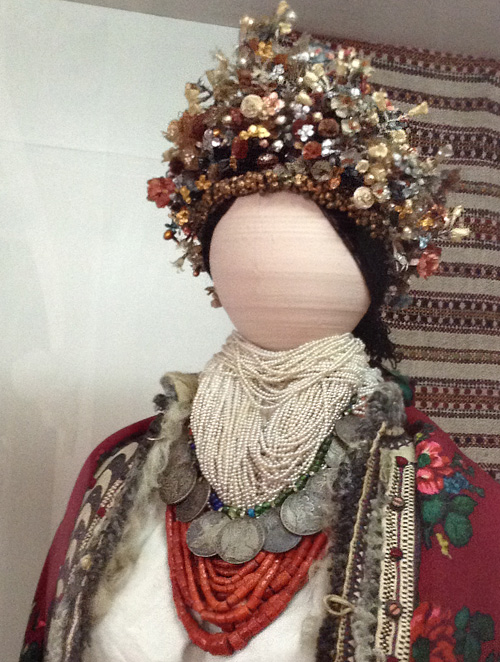
Women's wedding dress from Kolomyia district, Ivano-Frankivsk region, the beginning of the 20th century. Close-up view
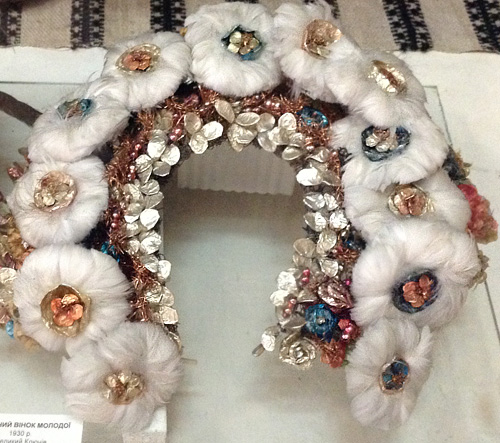
Bride's wedding headdress. Kolomyia district, Ivano-Frankivsk region, 1930. It is a wreath made from feathers and artificial flowers
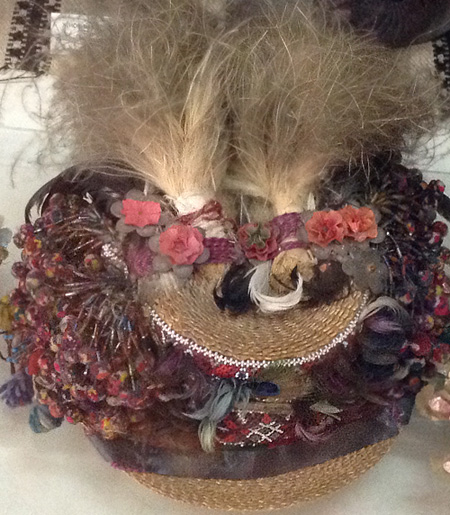
Groom's wedding headdress. Snyatyn district, Ivano-Frankivsk region, the end of the 19th century. It is a straw hat with plenty of decorations: embroidery, feathers, artificial flowers, yarn pom-pons, and two large tassels (made from special grass) on top
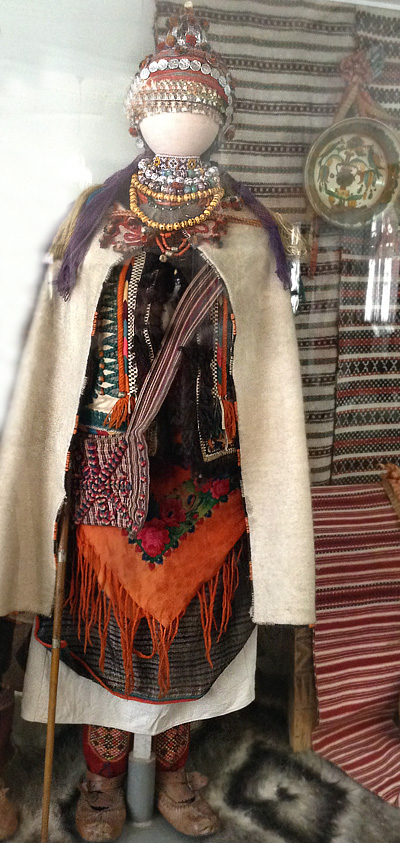
Women's wedding dress of the western part of Ukraine. This clothing was made in Verkhovyna district, Ivano-Frankivsk region, at the beginning of the 20th century. The outfit consists of a long shirt, a wrap-around skirt called "zapaska", a kerchief worn around the waist, a sleeveless fur coat called "keptar", an outerwear called "guglya" (a white embroidered sleeveless cloak), an intricate wedding headdress, hand knitted socks, leather shoes called "postoly", a woven shoulder bag, a lot of jewelry, and a walking stick with carving (a lot of people used such sticks to walk through the mountains)
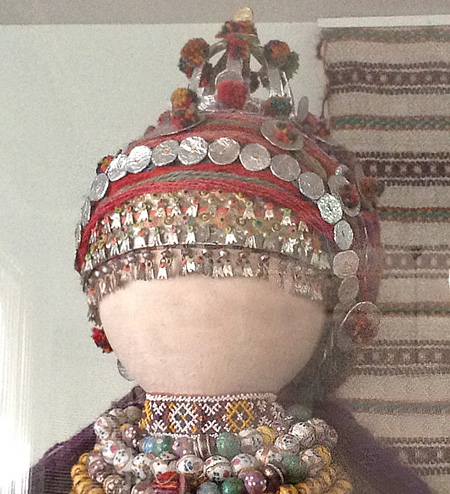
Traditional bride's wedding headdress. Verkhovyna district, Ivano-Frankivsk region, the beginning of the 20th century. Close-up view
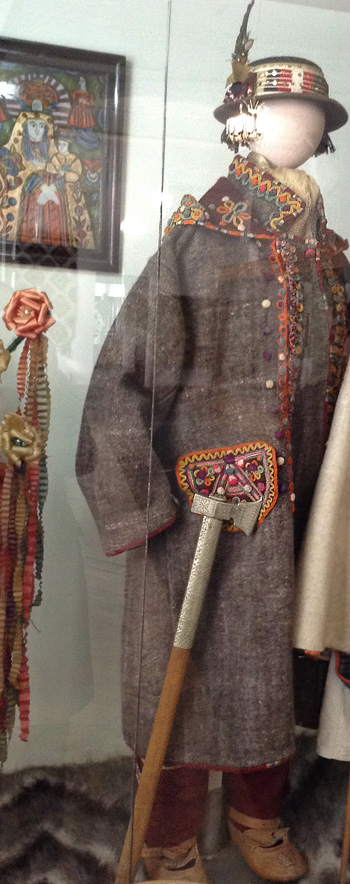
Men's wedding dress of the western part of Ukraine. This clothing was made in Verkhovyna district, Ivano-Frankivsk region, at the beginning of the 20th century. The outfit consists of a shirt, trousers, a sleeveless fur coat called "keptar", a long woolen outerwear called "serdak", a silk kerchief around the neck, a hat called "kresanya", woolen puttees with embroidery, leather shoes called "postoly", and a traditional hatchet of Ukrainian Hutsuls called "bartka"
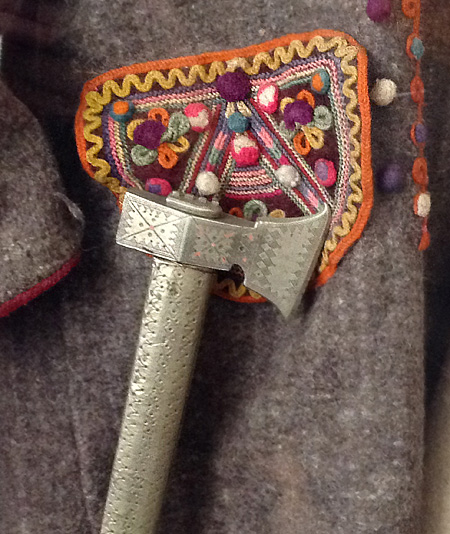
Richly embroidered pocket of a male's long woolen outerwear called "serdak", and the traditional hatchet of Ukrainian Hutsuls called "bartka"
Samples of embroidered shirts used in Carpathian regions of Ukraine in the 20th century. In Western Ukraine, people used a lot of colorful embroidery, floral and geometric patterns. The traditional embroidered shirts of Hutsuls looked very festive and bright (the most multicolored and richly embroidered shirts in the whole Ukraine)
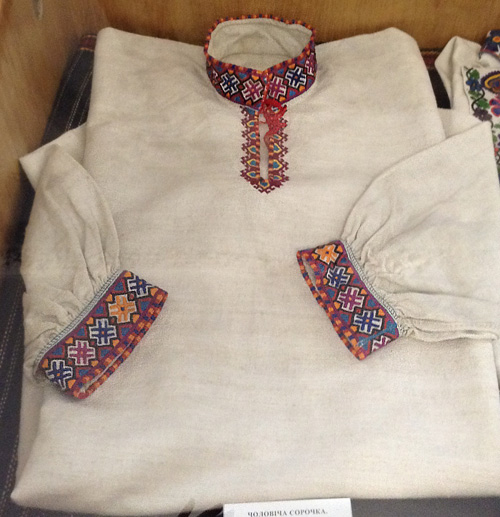
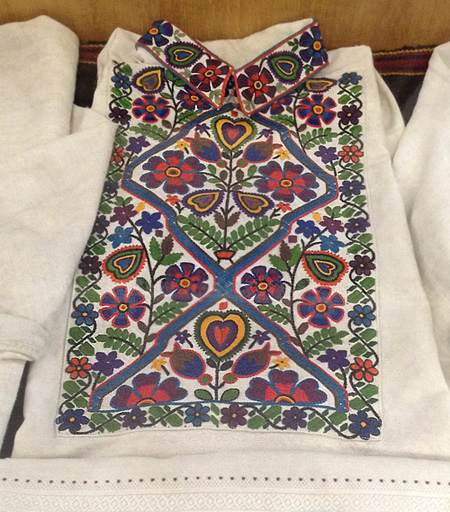
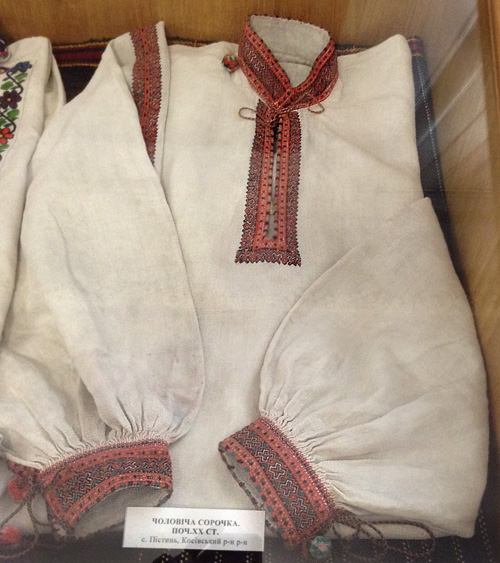
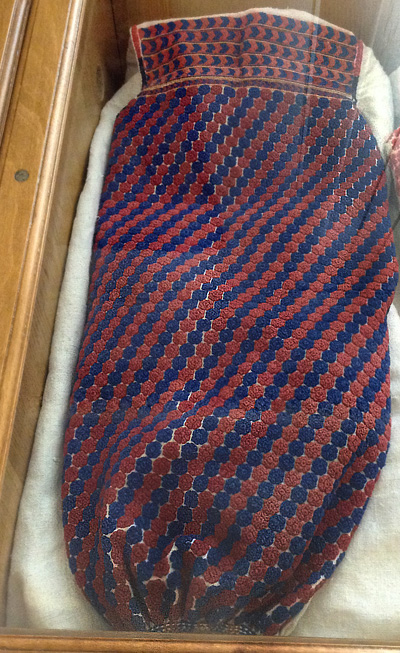
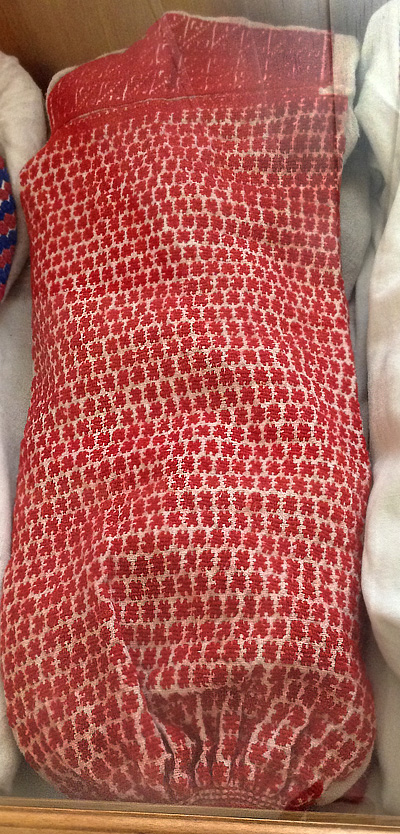
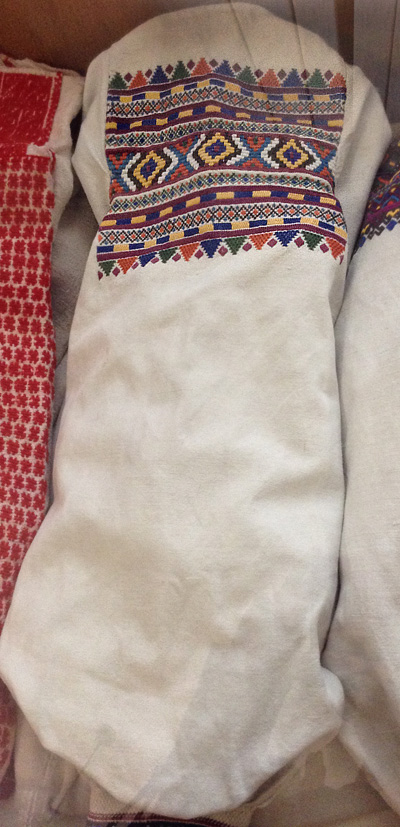
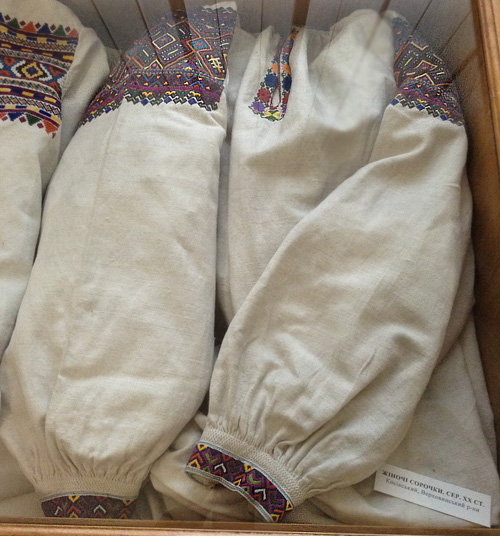
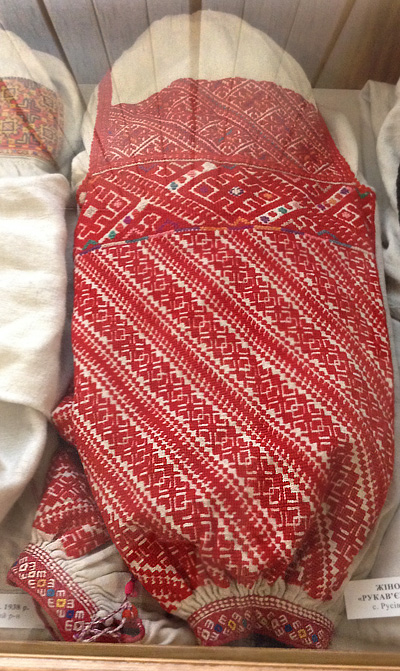
<
